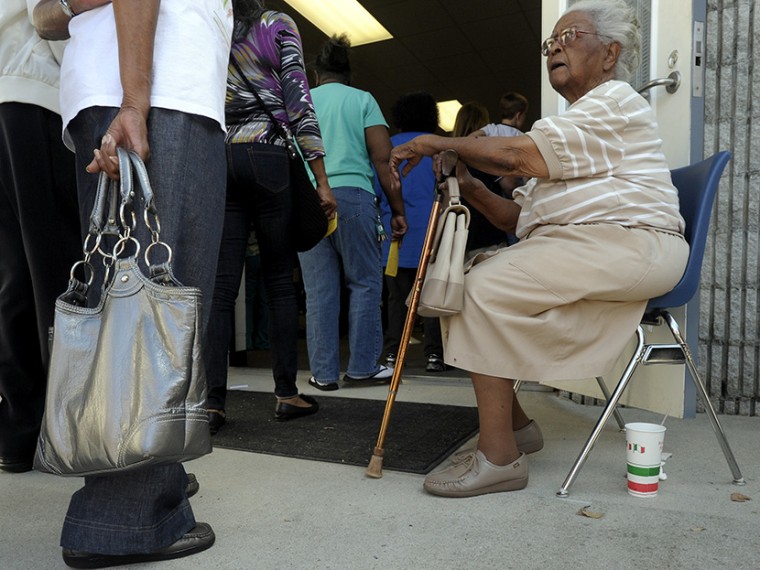Civil rights leaders and local elected officials emerged optimistic and determined to help protect the right the vote after a closed-door meeting with President Obama in which they discussed the way forward after last month’s Shelby County v. Holder ruling gutted the Voting Rights Act.
Obama said he was disappointed in the Supreme Court’s decision in the hours after it was announced, but promised to continue the fight against “voting discrimination.”
Attorney General Eric Holder and Labor Secretary Tom Perez attended. Perez served as Assistant Attorney General for the Justice Department’s Civil Rights Division, where he oversaw many voting issues, before Obama nominated him to run the Labor Department this year. Representatives from a wide variety of civil rights groups attended the meeting, including the National Action Network, NAACP, ACLU, National Council of La Raza, Asian American Legal Defense and Education Fund, and National Urban League.
Rev. Al Sharpton said after the event that he and others in attendance were encouraged by commitment of both Obama and Holder to protecting voting rights. He also said that his and other civil rights groups represented at the meeting will be working with the DOJ in their fight to collect evidence of discrimination.
“We’ve been assured by the president and attorney general that they will continue to aggressively fight to protect the right of all Americans to vote,” he said. “They are open to many of us on the ground to continue to use the Voting Rights Act--it is not dead--and to resources to bring information of any violation of voting rights directly to the Justice Department.”
“There is a wound in the voting rights act but it is far from dead, it is not even on critical, and we intend to use the information that we have today to assure our constituents that we intend to aggressively fight to protect those rights in all communities, which is why everyone--the Latino, the Asian, the black communities--were represented in this meeting today,” he added.
Barbara Arnwine, of the Lawyers’ Committee for Civil Rights Under Law spoke about the role that coalition will play in the effort to help convince Congress to move forward towards fully reinstating the Voting Rights Act.
“We will be working very closely with all the groups here and others to conduct hearings across the country in order to help Congress develop the record that is needed [to protect voters,]” she said.
“We’ve marched in Alabama together against voter suppression and against the anti-immigration laws,” Janet Murguía of the National Council of La Raza said. “And I just think the strength of this coalition represents the strong unity and commitment that everyone must have that right to vote.”
That coalition of groups represented at Monday’s meeting also included the ACLU, NAACP, Asian American Legal Defense and Education Fund, and Lawyers’ Committee for Civil Rights Under Law, among others.
Many of the leaders in attendance spoke about the role that the events celebrating the 50th anniversary of the March on Washington will play in the continuing battle for voting rights.
“We will emphasize voting and we will launch a huge voter mobilization and voter registration drive on August 24at that march,” Sharpton said.
“We’re all looking forward to August 24, and the march on Washington when we’ll have an opportunity for America to see how much not only these individual groups but Americans – millions of Americans from all over the country – feel about this right that is preservative of all our other others,” Sherrilyn Ifill of the NAACP Legal Defense Fund added.
Last week, Holder announced the Justice Department would push a federal court in Texas to create a new pre-clearance requirement for voting changes in the state, similar to the VRA regulations. The new approach attempts to leverage powers given under Section 3 of the Voting Rights Act, which was not impacted by the Court’s recent decision.
Texas Republicans have criticized Holder, arguing that he is trying to circumvent the Court’s decision, with Republican Rep. Lamar Smith complaining that Holder is trying to “mess with Texas.”
National Urban League President Marc Morial praised Holder and the DOJ for their willingness to use all tools at their disposal to reenact the right to vote. He also spoke about the importance of “broad bi-partisan support” in helping to protect the right to vote, and the need to keep an eye on action in the states.
In North Carolina—another state previously covered by the VRA—Governor Pat McCrory is expected to sign a new sweeping piece of election legislation that’s drawn sharp criticism from civil rights leaders. The legislation would create a voter ID requirement for residents, shorten early voting, and even end pre-registration for future voters nearing their 18th birthdays. When asked about his support for some of the more controversial aspects of the bill this weekend, McCrory revealed he was not familiar with all of it.
UPDATED 6:15 p.m. ET with quotes and information from the meeting.
